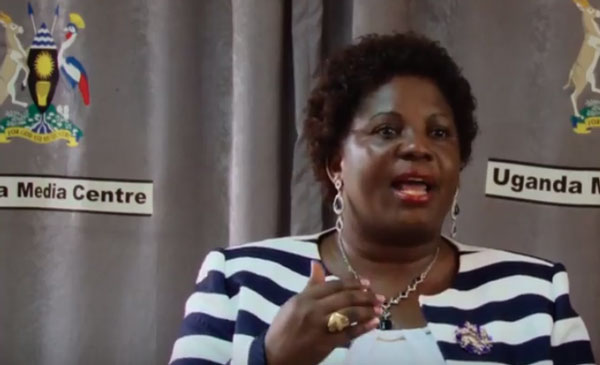
But immediately after the bill was read in Parliament, Shadow Attorney General Wilfred Nuwagaba who also seats on the Legal and Parliamentary Affairs Committee asked whether it was procedurally right for the Attorney General to defy the directive of the Speaker and the orders of this House to come up with a bill that is intended “to steal our land?”
Then a week after, on July 20, the opposition in parliament through their leader Winnie Kizza announced plan to traverse the country to urge voters to pressure their MPs to reject the amendments. The amendment requires two-thirds majority to pass. The opposition leaders want to hold public discussions on the Bill. Kizza says the Bill is not brought in good faith.
“It’s going to deprive Ugandans of the right to own property,” she said.
Government as victim
As opposition mounts, the government is fighting back by casting itself as the victim. It says compensation disputes are stalling government projects and has asked its departments to compile all such cases.
The Ministry of Lands on June 22 wrote to ministries and government bodies affected; including Ministry of Energy, Kampala Capital Council Authority (KCCA), UNRA, Uganda Investment Authority, Uganda Electricity Generation Company Ltd, Uganda Electricity Transmission, Uganda Electricity Distribution and the Rural Electrification Agency to produce the evidence.
The Minister of Lands, Betty Amongi, has also been on a major public relations campaign on radio and TV to make the same case. She says the government has suffered losses of US$97 million between last year and now over project delays caused by compensation suits in courts. She says contractors whose machines lie idle as government bickers with landlords want the money as compensation.
“With the law, we can avoid such losses,” she told The Independent in an interview.
But critics accuse Amongi of failure to concede that she knows the problem, has failed to fix it, and is tackling non-issues. The problem, according to this group, are powerful people, especially in government, who have made it a huge business to buy land in every place where government intends to start a project and connive with project officials in government to diddle the government using exaggerated compensation amounts. In an interview, Amongi points this out herself. She adds that the biggest challenge is that every property owner wants to fix their own price making it impractical for compensations to happen swiftly. Some of the biggest compensation budgets have been Shs80billion for people affected by construction of the refinery in Buseruka Hoima district and Shs100 billion to compensate 700 persons affected by construction of the Kampala – Entebbe Expressway. Most of this money has gone to the rich and powerful while the poor are left to cry.
As a result, opponents of the Constitutional amendment say it unnecessary. They say the government either has a hidden agenda or it is merely failing to see easier alternative ways out of the quandary. Many claim even if parliament, where the government holds sway, passes the amendment, it will be challenged in court and be defeated.
A top lawyer and Chairman of Kampala Land Board, Yusuf Nsibambi, had earlier told The Independent that the government could be hiding its real motive. If government wants to acquire land, he explained, the law already caters for that. First it must explain to parliament why it needs the land, and then it must value the land at the prevailing market price, compensate people, and then use the land.
“Why are these people trying to grab people’s land?” Nsibambi said.
According to him, the Land debate might be intended to divert people’s attention.
“Because government knows that people are passionate about land, they are bringing up this issue of compulsory acquisitions to divert them from the critical questions of governance that people are currently focusing on,” he said.
Another lawyer Shamim Nalugemwa says the law already allows for government to acquire land compulsorily where it is necessary either for public use, public health or defense. She adds that the courts already ruled that the idea of government taking people’s land without compensating them is unlawful in reference to the now famous case of UNRA Vs. Irumba Asumani& Peter Magelah where land in Hoima district was used in the upgrade of the HoimaKaiso – Tonya road before compensating him. The ruling followed an appeal in which UNRA was challenging a decision of the Constitutional Court that declared Section 7(1) of the Land Acquisition Act as unconstitutional and in contravention of Article 26 of the Constitution.
But for some observers, amending the law has actually been President Museveni’s agenda for long. In October 2014, during the Mineral Wealth conference, Museveni said that the mistake government was doing was making investors deal with land owners. He said the people had no right to stop the state from accessing its assets and called for the amendment of the Mining Act so that investors interested in mineral-rich land could negotiate with the government.
“The people who have to give you consent are the people who own the minerals, and that is the government. The other man has no consent to give because the property is not his,” Museveni said referring to the land lord.
Museveni has attempted to give away land several times but faced resistance. The most recent cases are in Amuru District where he attempted to give out 40,000 hectares to sugarcane planter. The other famous case is the Mabira saga where he attempted to give out part of the forest for sugarcane planting by another sugar manufacturer. This one sparked riots in which some people died.
****
 The Independent Uganda: You get the Truth we Pay the Price
The Independent Uganda: You get the Truth we Pay the Price



